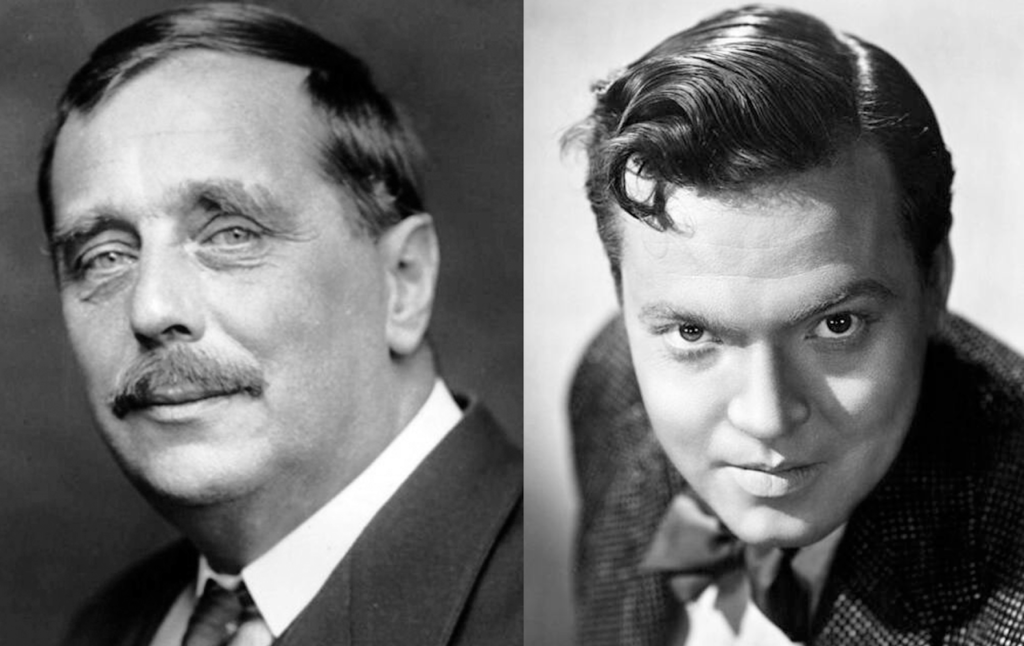
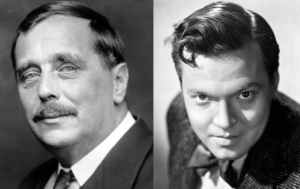 **** Lucid Theatre’s “Wells and Welles” is based on a hypothetical meeting between H.G. Wells and Orson Welles in October 1940 when both are visiting San Antonio, Texas, on separate lecture tours. Playwright Amy Crider has given voice to these two celebrated 20th century men from the world of literature, journalism, and the arts, and plays up the coincidence of their being alive at the same point in time. Pete Blatchford, who plays the elder Wells, sports a classic British accent and looks practically just like the original science fiction writer. Gerrit Wilford, who plays the younger Welles, has a remarkable resemblance to the American actor, director, writer, and producer. What perfect people to inhabit the bodies and souls of these two original thinkers! Plus the play’s director Amber Mandley has brought out the best from the actors, whose meaningful interaction could not have performed any better.
**** Lucid Theatre’s “Wells and Welles” is based on a hypothetical meeting between H.G. Wells and Orson Welles in October 1940 when both are visiting San Antonio, Texas, on separate lecture tours. Playwright Amy Crider has given voice to these two celebrated 20th century men from the world of literature, journalism, and the arts, and plays up the coincidence of their being alive at the same point in time. Pete Blatchford, who plays the elder Wells, sports a classic British accent and looks practically just like the original science fiction writer. Gerrit Wilford, who plays the younger Welles, has a remarkable resemblance to the American actor, director, writer, and producer. What perfect people to inhabit the bodies and souls of these two original thinkers! Plus the play’s director Amber Mandley has brought out the best from the actors, whose meaningful interaction could not have performed any better.
In an extraordinary twist of fate, Orson Welles, the “boy genius,” initially comes across H.G. Wells in his hotel room in the midst of a furious thunderstorm. When Orson knocks on the door and insists that he desperately needs to get out of the rain, he has come well equipped with a bottle of brandy. The two men are already acquainted with each other, although it’s unclear if they know each other by sight. Orson had previously adapted H.G.’s original book “War of the Worlds”, turning it into his 1938 radio broadcast which created a major scare among listeners who sincerely believed that the Earth was being invaded by Martians. This event subsequently created a kerfuffle between them as to whether Orson should have first obtained H.G.’s written permission. But once this issue is apparently resolved, a unique set of conversations follows between the two, ranging from the usefulness of fiction, the importance of good journalism, thoughts about the war in Europe, and what it means to make futuristic predictions. Especially compelling is listening to them bat around the idea that reading novels can potentially play a more important role in how we come to understand the way that the world operates as compared to just reading newspapers and nonfictional accounts.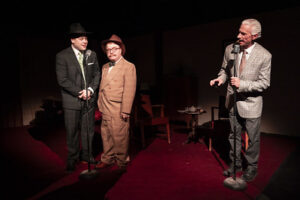
As for the plot, Orson is about to star in the Hollywood movie “Citizen Kane” and is trying hard to get publicity for it. He believes that the person who would best attract the attention of the American public and garner interest in his upcoming film would be the greatest living author on the planet, namely, H.G. Wells! But H.G. is not enthralled with the idea of appearing on the radio for publicity purposes—at least not at first. Shortly thereafter, they come to an understanding whereby Orson would agree in return to work with H.G. on a future project: that is, to turn H.G.’s earlier book “In the Days of the Comet” (1906) into a Hollywood movie. But H.G. soon realizes that this is an empty promise, which angers him to no end. But eventually after some back and forth, he relents and agrees to appear on a radio broadcast with Orson after all. At the radio station, announcer Charles C. Shaw (Jeff Broitman) introduces the two of them on air, where we see them mostly engage in pleasantries, unlike previous contentious exchanges.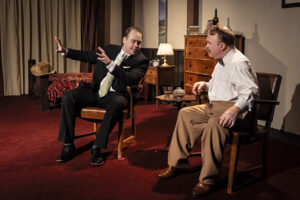
This is a rather intellectual piece, and the imaginary banter between the 75-year-old H.G. and the 25-year-old Orson is provocative and intriguing. Despite their 50-year difference, the two characters hold their own very well. We hear a number of references to H.G.’s many books; and I liked hearing how H.G. notes that while he has written some of his most important works when he was a young man, the start of every project is always new and exciting no matter how old you are. We also learn plenty of biographical information about both: from their family lives to their health conditions to the fact that it was Orson’s father who inserted an “e” into their last name. There are moments when almost too much information is being thrown at the audience, and this is where the show becomes somewhat heavy and highbrow. Be prepared to think about the many references to 20th century history and literature throughout. But if you can weed through all this detail, it’s not implausible to consider that these two men could have had these very conversations had they ever been at the same place at the same time.
Kevin Rolis’s set design cannot be excelled! I enjoyed seeing the vintage hotel room with the 1930s desk and the L.C. Smith manual typewriter, down to the oranges in the basket and the orange pieces on a plate. The music of the era fills the sound system before the show starts. Kudos to Alvaro Ledesma for excellent lighting and sound design! Also thanks to the unnamed person who has brought in the actors’ food. As renowned acting teacher and director Lee Strasberg once said, an audience likes to see actors eat on stage. It makes a performance seem more natural and relatable.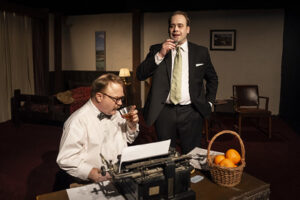
This 75-minute play based on true events is exactly the type of theatrical performance which could open to much fanfare if it were to premiere in London. To my mind, its witty and astute dialogue is more likely to appeal to a British audience than an American one due to the fact that H.G. Wells was a well-known British author. It is no accident that the show is set in October 1940, a month after the blitz started and Britain felt the brunt of German bombings: a travesty that crystalized the spirit of the nation and whose memory remains to the present day. With H.G. being a futurist, the question on the table is how accurate he might have been in predicting Herr Hitler, the onset of World War II in Europe, and the likelihood of the atomic bomb. Moreover, a British audience might better identify with H.G.’s belief that Americans were so bumbling in thinking that Orson Welles’ radio adaptation of “War of the Worlds” was an authentic report on a real interplanetary invasion. I need to add that what might be of less interest to a modern audience (British or American) is Orson’s taking on the starring role in “Citizen Kane.” While that archetypical story was important years ago in bolstering the values of American democracy, it may seem almost too improbable and dated in today’s political environment.
In sum, “Wells and Welles” is a cleverly constructed and well-written show that is not only a credit to Crider’s insightful vision but also a noteworthy personal achievement. In addition to creating the script, the playwright funded the full run herself with her retirement savings and created her own theatre company, hired her own actors and crew, and rented out City Lit’s space while the troupe was on summer hiatus. Her labor of love thus deserves a wonderful reception from a rapt audience, grateful for the revival of these two important men of letters, whose steadfast resolve and personal philosophies can tell us a lot about their character and the era that they once lived in.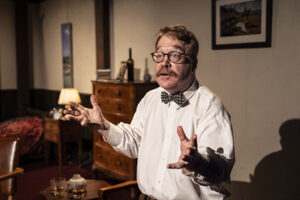
“Wells and Welles” is playing through August 11, 2024, at City Lit Theater, 1020 W. Bryn Mawr Avenue, Chicago (on the second floor of the Edgewater Presbyterian Church).
Tickets are: $25.
 Performance schedule:
Performance schedule:
Thursdays, Fridays, and Saturdays at 7:30 p.m.
Sundays at 3:00 p.m.
For information about this show, please visit: https://sites.google.com/amycrider.com/lucidtheater.
To purchase tickets, visit: https://www.eventbrite.com/e/wells-and-welles-tickets-887960091537.
To see what others are saying, visit www.theatreinchicago.com, go to Review Round-Up and click at “Wells and Welles”.






More Stories
“The Firebugs” reviewed by Julia W. Rath
“The Book of Grace” Al Bresloff with another from Paul LIsnek
“The Last Five Years” MILWAUKEE